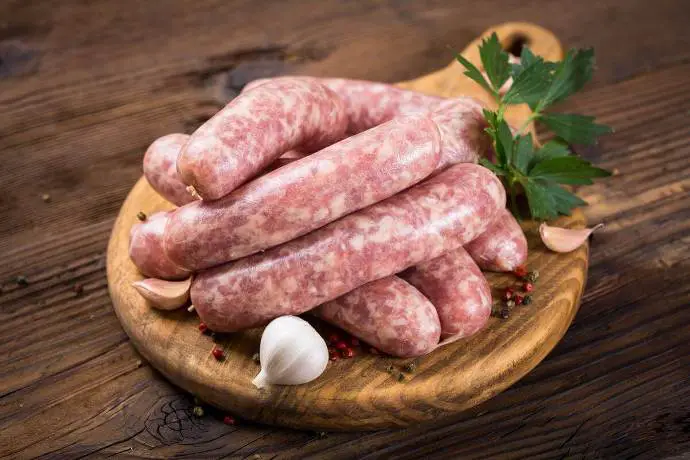If you’re like me, you’ve probably wondered about the ingredients in the food you eat. And when it comes to sausage, specifically fresh sausage, the question arises: does it contain nitrates?
In this article, we’re going to dive deep into the topic of nitrates in fresh sausage and provide you with all the information you need to make an informed decision.

Table of Contents
What Are Nitrates?
Before we get into the nitty-gritty, let’s take a moment to understand what nitrates actually are. Nitrates are natural compounds that can be found in various vegetables like spinach, lettuce, and celery.
They’re also used as additives in processed meats to enhance flavor, color, and preservation.
Why Are They Used in Meat?
Now, let’s talk about processed meats. You know, the ones like bacon, ham, and hot dogs that you often find at the grocery store. These types of meats often contain nitrates, and they serve a few purposes.
First off, nitrates act as a preservative, helping to extend the shelf life of these products. They also give processed meats that distinctive pink color we’re all familiar with.
And last but not least, nitrates contribute to the flavor development of these meats, giving them their unique taste.
Does Fresh Sausage Contain Nitrates?
When it comes to crafting delectable fresh sausages, such as the beloved Italian sausage, the question of nitrates naturally arises. The key distinction between fresh sausages and their cured counterparts lies in the absence of nitrates.
Fresh sausages are made from fresh meat combined with natural salt, without the use of curing salts containing sodium nitrite and sodium nitrate.
In the food industry, nitrates are often added as preservatives. Their purpose is to prolong the shelf life of products, a practice that aligns with mass production and cost savings.
If you’re concerned about the potential health risks associated with nitrates, creating your own fresh sausages allows you to take control of what goes into your food. By eliminating nitrates from the equation, you’re opting for a more natural and wholesome option.
Making large batches for later use is a convenient approach, especially if you want to enjoy the fruits of your labor at your leisure.
The preservation method you should employ for your homemade fresh sausages is simple: freezing. Freezing is a safe and effective way to ensure your sausages remain fresh and ready for consumption.
On the flip side, cured sausages are a different breed. These delectable treats often undergo a cold-smoking process. The curing salts they contain serve a dual purpose by enhancing flavor and protecting the sausages from bacterial contamination.
It’s important to note that while cured sausages can be cold smoked, you can also enjoy the smoky flavor with uncured sausages.

>>Also read: How to Fix Dry Sausage
Are Nitrates Bad For You?
Certain vegetables, such as beets, spinach, celery, and carrots, are known for their naturally high nitrate content.
These vegetables acquire nitrates from the soil, and they have long been considered a staple in a healthy diet.
We all recognize the nutritional value of vegetables, and beets, in particular, have been studied for their impressive health benefits.
Research suggests that beets can help enhance physical performance and lower blood pressure, making them a valuable addition to your plate.
Interestingly, nitrates are not just found in vegetables but are also a key component in medications used to treat angina (a heart condition).
Nitrates, as the active ingredient in these medications, work by dilating blood vessels, thus improving blood flow to the heart. Their role in the pharmaceutical world underscores their importance in maintaining cardiovascular health.
While nitrates have a place in medicine and are abundant in certain vegetables, the story takes a different turn with processed meat.
Studies have indicated a potential link between the consumption of significant amounts of processed meat and an increased risk of cancer, specifically stomach and intestinal cancer.
Surprisingly, it’s not the nitrates that are directly responsible for this cancer link, but rather a compound known as nitrosamines.
When nitrates are exposed to an acidic environment, such as the stomach, and come into contact with proteins, nitrosamines can form. Processed meats are rich in proteins, making them a conducive environment for nitrosamine formation.
Nitrosamines can also develop when nitrates are exposed to high temperatures during cooking.
For example, frying bacon at high heat can lead to the formation of these potentially harmful compounds.
This revelation highlights the importance of considering cooking methods and temperatures when it comes to consuming nitrates.
It’s essential to recognize that while nitrates in processed meats may play a role in cancer-causing, there are other factors at play as well. It’s not a one-dimensional issue, and researchers continue to explore the multifaceted nature of this association.
In conclusion, nitrates are not inherently bad for you. It’s the way they are prepared and consumed that can cause problems and health effects.
How to Determine if My Meat Is Free of Nitrates

Analyzing the Nutrition Label
A quick and effective method to determine whether your meat contains nitrates is by examining the nutrition label.
Sodium Nitrate or Nitrite: If the label lists sodium nitrate or sodium nitrite as ingredients, it’s a clear indication that the product contains synthetic nitrates.
Potassium Nitrate or Nitrite: Similarly, if the label mentions potassium nitrate or potassium nitrite, you should be aware that synthetic nitrates are present in the meat.
Opt for Organic Meats
Choosing organic meat is another surefire way to avoid nitrates. Organic foods are produced without synthetic preservatives (like nitrates or nitrites).
Therefore, if a meat product is labeled as organic, you can rest assured that it is nitrate-free.
Inspect Label Claims
The information provided on the label can be a valuable source of knowledge regarding the presence of nitrates. Keep an eye out for the following label claims:
- “Nitrate-Free”
- “No Nitrates”
- “No Nitrates Added”
When you see any of these claims on the meat packaging, it indicates that the product is free from nitrites and synthetic nitrates.
It’s essential to keep in mind that the tips mentioned above primarily pertain to synthetic nitrates and nitrites and do not cover naturally occurring nitrites and nitrates. The label will specify whether synthetic nitrates or nitrites are used, but they can still be preserved using natural nitrites found in ingredients such as celery.
In Conclusion
Fresh sausage, in general, does not contain nitrates. Unlike processed meats, it is made without the addition of nitrates during the curing process. This means you can enjoy the goodness of fresh sausage without worrying about the potential risks associated with nitrates.
Just remember, moderation and a balanced diet are key to maintaining a healthy lifestyle. So go ahead and indulge in some mouthwatering fresh sausage!
Preservatives like nitrates
Cured meat, deli, growth of harmful bacteria, nitrate and nitrite, nitrates are cooked at high, cause cancer, fresh meat and natural salt, bacon and sausage, don’t contain nitrates, prevent the growth of harmful, natural nitrites from celery, sausage like, ham or bacon, fresh italian, like italian sausage, like italian, smoked sausage, italian sausage products, dry-cured sausages, processed sausages, buying hot dogs or sausages, sausages from the store, nitrites and not naturally occurring, nitrites but can be preserved, uncured meat containing natural nitrites.

Fernando is the creator and writer behind the food blog Eating with your Hands. Living and working in cities like Paris, Barcelona, and Berlin, and being married to a Canadian foodie, has given Fernando a passion and interest in food and inspired him to run EWYH.
